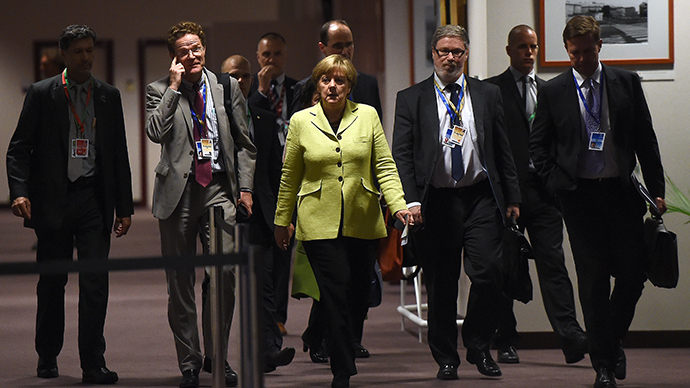Greece’s ‘first real proposals’ raise hope of debt deal ‘in 48 hours’

Despite failing to reach an immediate agreement with international lenders, Greece hopes to secure a bailout deal this week to avoid a potential euro exit, after submitting a new “promising” plan which focuses on tax hikes and pension reform.
“We will finalize the process this week,” European Commission President Jean-Claude Juncker told reporters after the meeting, as Athens hopes to secure the final €7.2 billion tranche of its international bailout to repay creditors interest on its debt.
So far creditors have refused to release the funds unless Greece agrees to more austerity measures, which are highly unpopular and contradict the Greek Prime Minister Alexis Tsipras’ election promises.
“Alexis Tsipras has convinced us of Greece’s seriousness and willingness to work constructively,” said European Council President Donald Tusk, adding that officials will work with Tsipras’ government to review the latest proposals from Greece. Greece’s latest plans “were the first real proposals in many weeks,” Tusk said.
Athens and the Troika of international lenders – the IMF, the ECB and European Commission – are gridlocked in negotiations over its €240 billion ($272 billion) debt. The current total Greek debt stands at €316 billion ($358 billion).
One of the main splits remaining is over the pensions reform where the entire system is running a massive deficit. Greeks have proposed a number of measures to raise another €2 billion via reforms.
Under the new plan, early retirement elimination would start in 2016 as the government hopes to raise the retirement age gradually to 67. In addition, Athens is proposing that supplementary payments to low-income pensioners to be replaced with another program.
Athens also offered to reform the value-added-tax system and set the main rate at 23 percent. In addition, Athens proposed to increase VAT on hotels from 6.5 percent to 13 percent. However raising VAT on restaurants from 13 percent to 23 percent, as demanded by creditors, has yet to be resolved. Athens also remains reluctant to raise a 13 percent VAT rate on electricity. More tax hikes have also been offered for business that make above €500,000 ($563,000), and on private incomes over €30,000 ($33,800).
By focusing on pensions and tax hikes, Greece hopes to improve its budget balancing, which has been one of the main points of contention during the tense rounds of negotiations. The lenders want Greece to hit a primary surplus target of 1 percent of annual GDP by the end of the year in the hope of achieving the 2 percent target in 2016 and 3 percent in 2017. Greece instead hopes to cap the surplus target of 0.6 percent but has signaled that it might be ready to agree to 0.75 percent.
READ MORE: Thousands rally in Athens amid summit to avert ‘uncontrollable Grexident’
Tsipras said that after the latest proposals the ball is now in the creditors’ court.
“We are seeking a comprehensive and viable solution that will be followed by a strong growth package and at the same time render the Greek economy viable,” he told reporters, as he asked for a debt relief as a condition for a deal.
In response to the Greek plea, the European Commission offered the struggling economy a helping hand to the amount of 35 billion euros ($40 billion).
“The Commission and I myself were proposing to our Greek friends a program of 35 billion to be disbursed from now and to 2020,” Juncker said.
The head of the EU commission said that the funds, one billion of which could be released this year will be provided to create new jobs in the Greek economy.
“This is not money, to put it simply, for the budget, but real money for the real economy. This is not only about budgetary consolidation, fiscal consolidation, although this is of permanent importance – but we need growth and we need jobs in Greece,” Juncker said.
Yet German chancellor Angela Merkel, warned that unless the European Commission, International Monetary Fund (IMF) and European Central Bank (ECB) reach a new deal with Greece, no new agreement on bailout funds can be contemplated.
“After the meeting there is no basis for a decision, so this can only be an advisory summit,” she said, after German finance minister, Wolfgang Schaeuble, earlier said he had seen nothing new from Athens.
IMF chief Christine Lagarde also expressed doubt about the Greek proposal.
“We have a huge amount of work to do in the next 48 hours. We are not at all at the end of the route,” Lagarde said on leaving the summit.
If the deal is reached, the new austerity measures still need approval from the Greek lawmakers.
“These measures cannot be voted, they are extreme and anti-social. I believe that in the end, this package which you have at hand, cannot come to the Greek parliament,” the vice president of the 300-seat House, Alexis Mitropoulos was quoted as saying by the Guardian.












